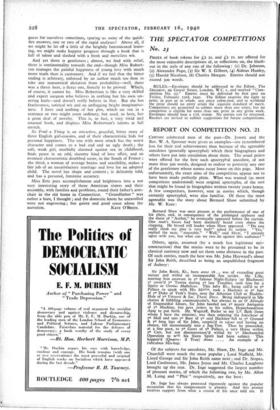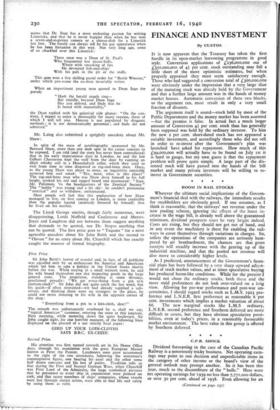REPORT ON COMPETITION NO.. 21 CERTAIN celebrated men of the
past—Dr. jowett and the Rev. W. A. Spooner were given as examples—are remembered less for their real achievements than because of the agreeable anecdotes (generally apocryphal) which their biographers and
others have put into circulation about them. The usual prizes were offered for the best such apocryphal anecdote, of not more than 30o words, designed to endear to posterity any one of the gentlemen whose names recur lower on this page. Most unfortunately, the exact aims of the competition appear not to have been made perfectly plain. What was wanted (as most competitors understood) were original apocrypha, of the sort that might be found in biographies written twenty years hence. A few competitors, however, sent in stories which, though certainly apocryphal, were also familiar. Of these the most agreeable was the story about Bernard Shaw submitted by Mr. W. Kent :
Bernard Shaw was once present at the performance of one of his plays, and, in consequence of the prolonged applause and the shout of "Author," he eventually appeared before the curtain. One man's hisses had been distinctly heard even above the clapping. He hissed still louder when Shaw appeared. "Do you really think my play is very bad?" asked its autbor. " Yes," replied the man, "execrable." " Well," said Shaw, I entirely agree with you, but what can we two do against this audience?
Others, again, assumed (by a much less legitimate mis- construction) that the stories were to be presumed to be in classical currency now and set them some distance in the past. Of such entries, much the best was Mr. John Hayward's about Sir John Reith, described as being an unpublished fragment of Aubrey : Sir John Reith, Kt., born anno 18—, was of exceeding great stature and withal an incomparable fast strider. Mr. Lilly, meeting him unaware in ye famous Night-Eclipse (or Blackness) yt cover'd ye Towne during ye late Troubles, took him for a Sprite or Genius Malleficus. This lofty Kt., being call'd to Ye Pallace to speak with His Mistie, took a Hackney at ye foot of ye Duke of York's Steps, next the Athenian Club or Huddle- Hole of ye Virtuosi & Sac. Theol. Does. Being indispos'd to idle chatter & fribbling communicatio's, but alwaies in an 0 Altitudo of Enigmatikal Ideaes, Sir John heeded not ye musty Antiquitie of ye Machine, but gave orders to his sullen, Hypochondriacic Agag to put forth. Mr. Wagstaff, Butler to my Ld. Bath (from whom I have the relation), was then enjoying the fraischeur of ye Mall and sees ye floor of ye said Hackney-fall to ye Ground & ye long legs of Sir John, surpris'd in vacuo and having no choyce, fall incontinently into a Jog-Trot. Thus he proceeded, at a fine pace, to ye Gates of ye Pallace, a very Horse within ye Cart, but not discountenanc'd withal by ye Mechanickal Operation to weh his Stern Spirit had been subject. This happen'd (Quaere: if True) Anno ..... An example of a ridiculous Mis-hap.
Of the subjects for anecdotes, Mr. Shaw, Dr. Inge and Mr. Churchill were much the most popular ; Lord Nuffield, Mr. Lloyd George and Sir John Reith came next ; and Dr. Stopes, Lord Castlerosse, Mr. James Joyce and Mr. Charles Laughton brought up the rear. Dr. Inge suggested the largest number of pleasant stories, of which the following two, by Mr. Allan M. Laing and " Phiz " respectively, are the best :
Dr. Inge has always protested vigorously against the popular accusation that his temperament is gloomy. And this protest receives support from what a cousin of his once told me. It
seems that Dr. Inge has a most endearing passion for writing Limericks, and that he is never happier than when he has won a seven-and-siApenny camera or a cheese-dish for a Limerick last line. The family can always tell by his gay appearance when he has been fortunate in this way. Not very long ago, some of us chuckled over this Limerick : There once was a Dean of St. Paul's Who frequented low music-halls, Where with smacking of lips He devoured fish-and-chips With his pals in the pit or the stalls.
This gem won a five shilling postal order for " Bertie Wooster," under which pen-name the ex-dean invariably writes.
When an impertinent young man quoted to Dean Inge the parody " Hark the herald angels sing— But timidly, because Dean Inge Has just arrived, and fords that he Is bored with immortality," the Dean replied with his quizzical side glance: "On the con- trary, I expect to enjoy it thoroughly for many reasons, three of which I will tell you. Heaven is not populated by dysgenic methods ; it is not democratically governed ; and fools are not admitted."
Mr. Laing also submitted a sprightly anecdote about Mr. Shaw:
In spite of the mass of autobiography sponsored by Mr. Bernard Shaw, more than one dark spot in his career remains to be exposed. I am told (and the story has never been contradicted) that in his early impecunious days in London, he and the late Gilbert Chesterton kept the wolf from the door by running an illicit whisky still in a Houndsditch cellar, which they used to visit from time to time disguised as rag-and-bone men. Once, as the young Shaw was about to enter, an inquisitive constable accosted him and asked: "'Ere, mate, what is this place?" The rag-and-bone man who was Shaw drew himself to his full height, stroked his red and ragged beard and murmured: " Sure, Mr. Polisman, 'tis the headquarters of the Zetetical Society." The " bobby " was young and a bit shy: he couldn't pronounce " zetetical " and so withdrew, embarrassed.
Most people will feel that this explanation of how Shaw managed to live, on first coming to London, is more creditable than the popular legend (zealously fostered by himself) that he lived on his mother.
The Lloyd George entries, though fairly numerous, were disappointing, Lords Nuffield and Castlerosse and Messrs. Joyce and Laughton did not between them suggest anything that demands to be quoted, nor Dr. Stopes anything that can be quoted. The first prize goes to " Taqume" for a most agreeable anecdote about Sir John Reith and the second to " Ojosan " for an entry about Mr. Churchill which has exactly caught the manner of formal biography.
First Prize.
Sir John Reith's horror of scandal and, in fact, of all publicity was equalled only by an enthusiasm for America and Americans which led him to take a holiday in the United States shortly before the war. While staying in a small western town, he and his wife found themselves one day inspecting goods in the large general store. The proprietor, standing at some distance, proclaimed proudly: "We gat evree-thung fram a pin to'n alarrum-clack!" Sir John did not quite catch the last word, but his quick—if often restrained—wit had already supplied a sub- stitute, and thinking there were no strangers in the place, he could not resist shouting to his wife in the opposite corner of the shop: " Everything from a pin to a loin-cloth, dear!"
The remark was unfortunately overheard by a, shall we say, " typical American " customer, entering the store at this juncture. Next morning, while motoring down the quiet boulevard, Sir John caught sight, for one horrible moment, of the following lines displayed on the placard of a not strictly local paper : GIRD UP YOUR LOIN-CLOTHS SAYS B.B.C. EX-CHIEF.
Second Prize.
His attention was first turned towards art in his Home Office days, through his association with the great European Master known as Peter the Painter. Londoners soon grew accustomed to the sight of the two attendants, following the statesman's contemplative figure, one bearing his easel and the other some half dozen canvases and his box of paints. Tradition tells us that during the First and Second German Wars, when Churchill was First Lord of the Admiralty, the large symbolical pictures that he presented to every ship in commission were painted on cork, and that many members of ships' companies, whose vessels were lost through enemy action, were able to find life and safety by using them as rafts.







































 Previous page
Previous page